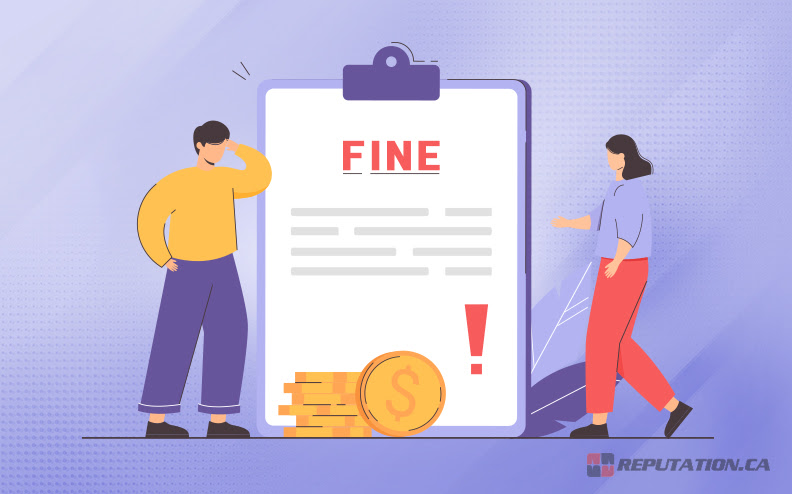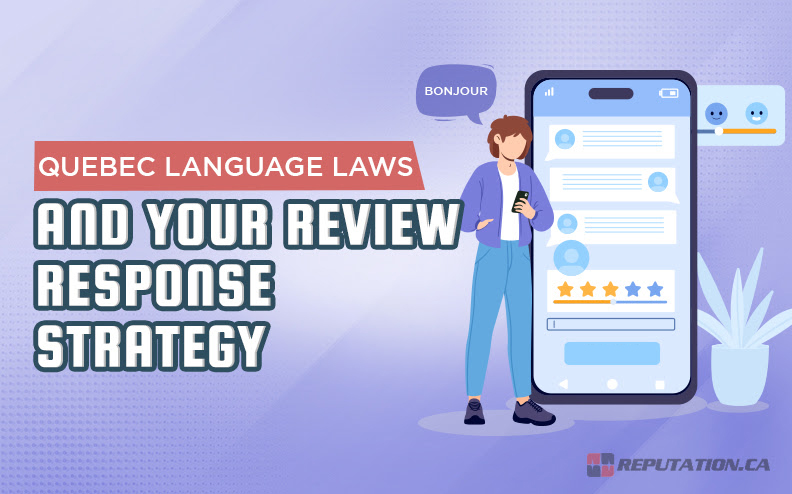A letter from Quebec’s language watchdog shows up about your review replies. On that same day, a competitor files a formal complaint against you. Business owners across the province run into this exact situation every day – they reply to customer reviews in English because it seems natural. Most of them have no idea that it goes against provincial law.
The OQLF received over 9,000 complaints in the past year (that’s a 33% increase from the year before). Review replies are one of the biggest problem areas for owners who don’t see the issue until the penalties arrive in their mailbox.
Bill 96 was passed in 2022, and the penalties got much steeper after that. A first offense will cost you at least $3,000 in fines and can reach as high as $30,000 per violation. Those fines can double or triple. The OQLF enforces these requirements on online content just as strictly as physical signage, and yes, they monitor sites like Google and Yelp to make sure that businesses comply.
Business owners who set up a French-first response system can avoid these penalties while showing genuine respect for Quebec’s linguistic identity at the same time. Violations come from pretty minor problems like the template order and the staff training protocols – easy fixes that most businesses can put in place fairly fast.
Here’s how Quebec’s language laws can change how you work with customer review replies!
Quebec’s French Rules for Review Replies
Most business owners think about storefronts and product labels when Bill 101 comes up. The law covers quite a bit more than that, though. Review replies count as public communications since anyone can find them and read them online.
Bill 101 establishes French as the priority language in Quebec, and this extends directly to customer review replies. Your response needs to be written in French first whenever you reply to a customer review in Quebec – this applies regardless of the language the original review was written in. You’re welcome to add an English version alongside it. But the French response has to appear first and stay just as visible.

Back in 2019, Walmart found out just how strict Quebec is about this requirement. Their team had been responding to customer reviews in English on the website, and Quebec fined them for it. The court said that those replies needed to follow the Charter of the French Language because the public could see them. Even though the customers had written their original reviews in English, Walmart’s replies still had to be in French.
Business owners figure they can respond in whatever language the customer used for their review. An English review gets an English response, and a French review gets a French one. But Quebec’s language charter has different requirements for this. Your response counts as commercial communication from a business and puts it in a different category than the original customer review.
Quebec makes this distinction because it views French protection as a collective right. Responding to a customer means you’re speaking for your business in a public forum. That means different requirements apply compared to a private conversation between two people.
How Much the OQLF Fines Cost
The OQLF keeps a close watch on online sites like Google, Yelp and Facebook to find businesses that don’t comply with Quebec’s language laws. Language compliance is a big priority for them, and when they find a business that breaks the law, they can hand out some large fines.
First-time violations will cost you at least $1,500 in fines. Get caught again, and those penalties can go as high as $30,000. In 2023, the OQLF swept through Montreal restaurants and gave out warnings to 47 different businesses in a single month. When they crack down on this, they’re very serious about it.

A competitor might report your business if you only respond to customer reviews in English. Or a customer might file a complaint after they see that your business doesn’t follow Quebec’s French language requirements online. Where the complaint comes from doesn’t matter – any one of them can spark an investigation that examines your entire operation.
Fines in the thousands of dollars aren’t something any business owner wants, and a government investigation isn’t any better. The upside is that you can take some steps to protect your business and to stay on the right side of Quebec’s language laws.
Build Your French Response System
A system that actually works is easier to set up. Most businesses find their best success when they develop bilingual response protocols right from the start, and they always make sure to list French first in every response.
La Capitale insurance is worth looking at for this challenge. Every year, the company deals with thousands and thousands of reviews, and they manage to stay on the right side of the law. It’s possible because French language support is built right into every step of their response process – this doesn’t mean that a person has to sit there and sort through each review as it comes in. A better way is to have a standardized system that the entire team can follow without overthinking each choice.
Your team is going to need to learn a handful of basic French phrases for the most common review situations. Even a basic thank you has legal requirements attached to it. When a customer leaves feedback, the response has to open with “Merci pour vos commentaires” before moving on to the English “Thank you for your feedback.” This will probably feel redundant at the beginning. After a few weeks, though, it turns into muscle memory.

Another consideration that matters is when to call in a professional translator. Some customer messages are manageable with standard phrases and templates. Others need somebody who actually knows what they’re doing. Your team needs training on how to tell the difference between the two. A basic thank you is easy. A longer response about a service complaint takes expertise.
Automation is what separates businesses that manage this well from those that don’t. Build your templates ahead of time. Create a resource document with pre-approved French phrases and make sure everyone on your team can access it. Your team needs to know where to find these tools when they’re needed – not waste time hunting around. When a new review comes in, your team should feel confident and ready to respond – not unsettled and unprepared.
Reviews written in multiple languages add some more layers to the whole process, and they can be tough for most teams to manage.
How Bill 96 Affects Your Digital Communications
Bill 96 came into effect in June 2022, and it changed the requirements for how businesses run in Quebec. It gave enforcement teams much bigger powers to search through business operations and to investigate possible violations. Also, the financial penalties for businesses that fail to meet Quebec’s language requirements became much steeper.
These changes apply to everything that you do online. Your chatbots need to follow the exact same language requirements that your human customer service team does. They have to meet the same standards as everything else. Even the emojis you use in customer replies can matter with these new requirements.
A tech company in Quebec City had to redesign its entire customer service bot to meet the new standards. The original system wasn’t built with these language requirements in mind, and Bill 96 made it mandatory for everyone.

The grace period for businesses to make these adjustments is gone. Businesses that kept delaying are looking at penalties because of it. Enforcement agencies have the funding, the staff and the legal authority to crack down on businesses that aren’t compliant, and they use every one of them.
Review replies are covered by these same requirements as well. Every reply you post to a customer review is considered an online communication under the law, and it applies across all sites – Google, Facebook or anywhere else that customers leave feedback. The automated messages that get sent out after a customer writes a review have to follow the same requirements as any response that your team writes by hand.
How to Handle Reviews in Different Languages
Reviews from your customers start to pile up. Tourists from Toronto or Boston write in English. A family from Japan writes in Japanese. A longtime customer from France might bounce between French and English in the exact same review.
Businesses have to find a way to respond that stays on the right side of the law as they keep their customer relationships in strong shape. The Fairmont hotels have actually done a good job with this over the years. When they reply to international guests, French always goes first, and then they’ll include an English translation whenever it makes sense – this respects the legal requirements and it also helps guests feel heard and welcomed.

This is a problem for English-speaking customers who aren’t sure why the response is in French. A few of them might doubt that anyone actually read their review at all. Others may just believe that the hotel is being rude or unfriendly on the job.
Direct communication works best here, as long as you don’t sound like a government pamphlet. Hotels can acknowledge guest feedback warmly in French and then add a quick line in English when it makes sense. Thank them for their visit and let them know you’ve taken care of it. You want to keep everything natural and personal instead of stiff or robotic.
Most travelers get it when a business has to follow local laws. What matters to them is feeling heard and like somebody actually cares during their stay. And you can do both at the same time. Review replies can be warm and genuine in any language, even with these laws in place.
Build a System for French Reviews
Bill 96 says businesses need to respond to French reviews in French. That sounds easy enough in theory. Most business owners just want to know how to make this work without spending hours each week on review replies.
A small library of response templates will save you time, and you can adjust them for each review. Try to draft three basic versions. The first one is for positive reviews – thank the customer and mention what they enjoyed. The second template is for complaints – you acknowledge the issue and promise to make it right. The third one sits in the middle for reviews that land in neutral territory – not glowing but not awful either.
Once you have these templates ready, they become your starting point each time. The basic structure doesn’t change. What changes are the specifics – you’ll adjust those to match whatever review you’re responding to. Templates save you quite a bit because you’re never sitting there staring at a blank screen. They also help you maintain the same brand voice, no matter who writes the response.

Review management tools have compliance features built right into them, and they monitor the language in your replies. The system will alert you if you accidentally reply to a French review in English – it all runs on autopilot in the background and helps you catch mistakes before they become compliance problems.
Smaller businesses on a tight budget can still take care of their French review replies without professional translation services. Translation software does the job to get you started. Anyone on your team who knows enough French can review the results every week or two.
The best part is that a system like this gets easier over time. Your templates get better as you use them. The same types of comments start popping up again and again after a stretch. Before long, replying to reviews turns into part of your weekly habit instead of a chore that eats up your time and energy.
Monitor and Manage Your Reputation
It isn’t meant to feel restrictive or to be some unnecessary barrier between your business and the customers who want to buy from it. A French-first response shows genuine respect for Quebec culture and for those who call it home – this authentic connection builds much stronger relationships with your customers in ways that English alone can’t replicate. Try out just one French-first template this week, and everything else will feel more manageable down the line.
Your reputation in Quebec can depend on the cultural expectations and the legal requirements that shape how customers see your business.

At Reputation.ca, we specialize in the management of reviews, social media, public relations and crisis response for Canadian businesses. Cancel culture may have already hit your business, or maybe you just want to have a better online reputation – we’re here to help either way.
Contact us today and we’ll put together a campaign that makes the most sense for your business!







